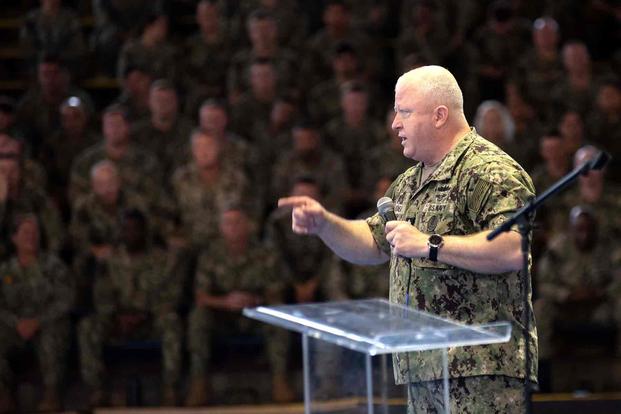The Navy's top enlisted sailor -- the master chief petty officer of the Navy (MCPON) -- has set his sights on making changes to one of the most closely held traditions of chief petty officer ranks: the initiation.
In an interview with Military.com at his Pentagon office Friday, James Honea, the 16th MCPON, explained that he wants to tackle "counterfeit behaviors" among his fellow chief petty officers -- collectively known as the Chief's Mess -- and among his hopes is that the induction of new chief petty officers becomes a far less onerous and time-consuming tradition.
While Honea's efforts to change some aspects of the chiefs' traditions is not new, the fact that they are being done as part of a broader attempt to address "organizational drift" and "mediocre leadership" -- phrases Honea used in a letter published Aug. 16 -- shows how seriously the Navy is taking the problems.
Read Next: West Point Opens 200-Year-Old Time Capsule and Finds … Silt?
Honea, who took the top enlisted job last year as the Navy faced continued problems with suicide and tainted water on ships, promised to be an advocate for sailors and their families. He sees his work in the mess and refining the process of transforming petty officers into chiefs as part of that mission.
"This first year's focus has been about chief petty officers because ... I think we're the focal point and they're the ones we're dependent on the most," Honea said in the interview Friday.
In addition to describing his efforts to bring about broader, philosophical changes of refocusing the mess on their jobs and refining the process by which new chiefs are initiated, Honea also said that there will be an update "in the next couple of months" in how chiefs are officially evaluated every year.
The Chief's Mess has long seen itself as something of a fraternity -- the "backbone of the Navy" -- charged with preserving the knowledge, traditions and spirit of the service.
An often-repeated adage is that "officers run the Navy, but chiefs make the Navy run."
The process of promoting new chiefs and inducting them into this group is a decades-old tradition that has become shrouded in mystery in the last half-century as it became more debaucherous and abusive to the recruits. Many of Honea's predecessors also took steps to rein in the initiation.
Military.com has previously spoken with sailors who served in the rank who described the immense power chief petty officers have to influence their subordinates' lives, both for better and worse. They can have an impact on anything from working hours to future career progression in the Navy.
Acknowledging this powerful responsibility, the promotion of sailors to the rank of chief has become a roughly six-week process, often known as "chief season," of training and instruction that begins the moment the names of the newly promoted sailors are released.
Initiation
The tradition of initiation into the Chief's Mess goes back decades. A history of the process, compiled by Master Chief James Leuci at the Naval History and Heritage Command in 2015, explains that initiations really took hold around World War II and drew much of their inspiration from "crossing the line" ceremonies. They were "simple, fun events" that often focused around tossing a new chief into a pool or ocean, Leuci wrote.
However, as the years went on, initiations grew more elaborate and more problematic. By the 1980s, "initiations morphed into activities that involved excessive, often dangerous, use of alcohol, along with mental and physical harassment," the report said.
By this point, the ceremonies also took on a much more secret nature since "there were humiliating activities inflicted on selectees that could only be performed behind closed doors."
By the 1990s, according to Leuci, the tradition got so out of hand that two MCPONs, Duane Bushey and John Hagan, were threatened by their chiefs of naval operations that, unless reforms were made, Navy brass would eliminate the tradition entirely.
Honea himself recalled his own initiation, conducted 25 years ago in 1998, and noted that it was far from the training ideal that the Mess holds up as the reason for the tradition.
Throughout the years, one tradition of initiation was that of a charge book -- a small journal carried around by selectees throughout the process in which chiefs leave notes.
"My book was not something that I walked away from in display with any kind of pride. My book was full of profanity, insults -- it's just not something that I was very boastful of," Honea recalled.
"It got thrown in the trash. I didn't keep it."
However, Honea says that this tradition -- in "a remarkable shift that I'm most proud of having been a part of" -- has changed and the books are now "a tome of advice and a pass down of wisdom from seasoned, experienced chief petty officers ... to keep for the rest of his or her career."
Despite the reforms, initiation as a whole remains controversial and debated.
Social media posts about the value of initiation and chief season crop up every year with sailors often refusing to partake in the process, wondering about the value of the experience, or asking whether they can still put on the rank without participating.
At least two sailors have died during initiation since 2015.
Honea argued that "there's a bunch of things that are done during chief's initiation that are still in lore, myths, and most of that stuff is not what exists today" but conceded that the truth of the changes are slow to reach rank-and-file sailors.
The modern induction also places a large burden on spouses and families of selectees.
Families typically do not see their selectee throughout the season since the initiation process often keeps them at their commands into the late hours of the night.
This is what Honea wants to change: the idea that "all the chief select does is go through initiation for six weeks and they're absent from their family and they're absent from the workplace."
"They need to come to work every day, and they need to be going home at a decent time to take care of their family -- those are their priorities," Honea added.
To him, the burdensome initiation is a misplaced priority or "counterfeit behavior that we've had in the past."
Counterfeit Behavior
In Honea's mind, chief petty officers have lost focus on what's important, leading some "to reward some of the wrong behaviors."
Aside from the problem of initiation, Honea thinks that the mess has become too focused on responsibilities and tasks that are outside of their jobs, like "fundraising, T-shirt sales, belt buckles, coins … the bumper sticker stuff about being a chief petty officer." Honea said that he believes those activities are driving attention away from the mission of the mess as being a repository of knowledge and leadership within the Navy's ranks.
In a set of yet-to-be-released letters titled "character," "competency" and "connections" that were made available to Military.com, Honea encourages the chiefs to be the connection between the junior sailors they manage and the officer corps that they advise and report to.
In the "connections" letter, Honea cautioned his fellow chiefs that "our egos can be our weakness, just as lack of care, burnout, laziness, procrastination, entitlement, and a victim complex can.”
"We have all seen this in our career and our Sailors suffer because of it," he added.
In the wake of a spate of suicides clustered at two Navy commands in Nofolk, Virginia, service investigations revealed that one factor in the lives of all the victims was leaders who were unaware of some of the issues their sailors struggled with and, as a result, offered no help.
Since then, senior chief petty officers like Force Master Chief Jason Dunn, the most senior enlisted sailor at the Navy's Installations Command, have noted that "the Chief's Mess and all sailors have an important role when it comes to supporting each other" and that "if we are unable to do that, that is where some of the risks lie."
Honea is taking this charge one step further.
"We have too many of our deck plate leaders that are abdicating those responsibilities because they feel like the authority has been taken away from them," he explained during the interview.
"You still have that responsibility," Honea said, before adding that "if we're not giving you all the tools to execute those responsibilities, you need to let us know."
-- Konstantin Toropin can be reached at konstantin.toropin@military.com. Follow him on Twitter @ktoropin.
Related: The Navy's Top Enlisted Sailor Is Ready for You to Ask Him Anything












